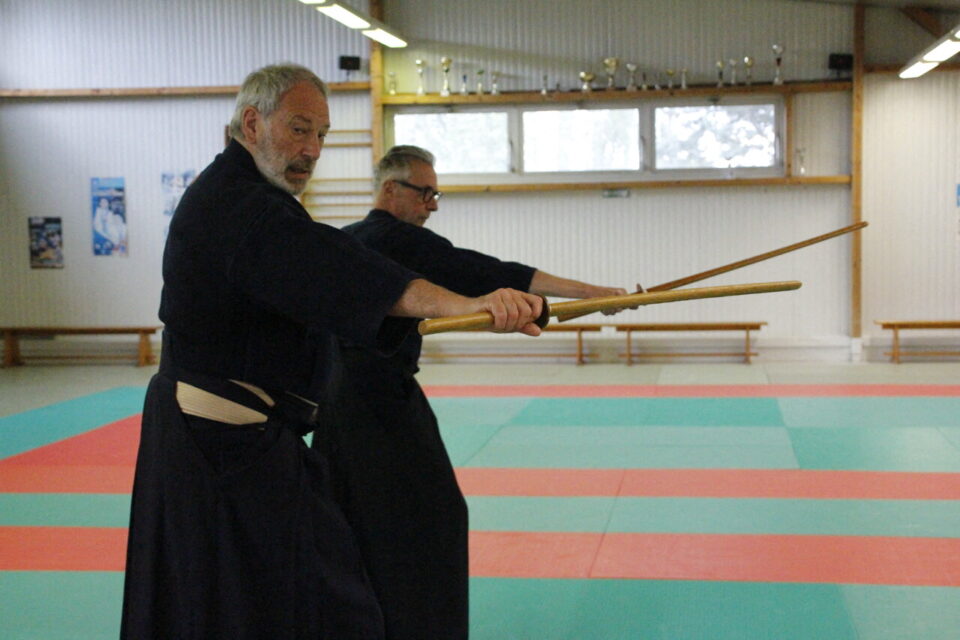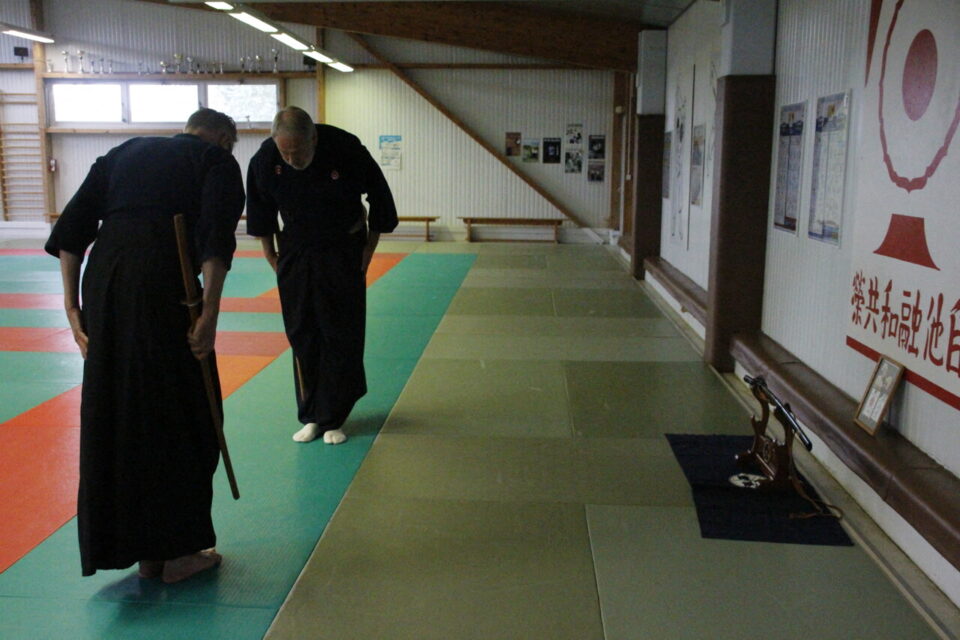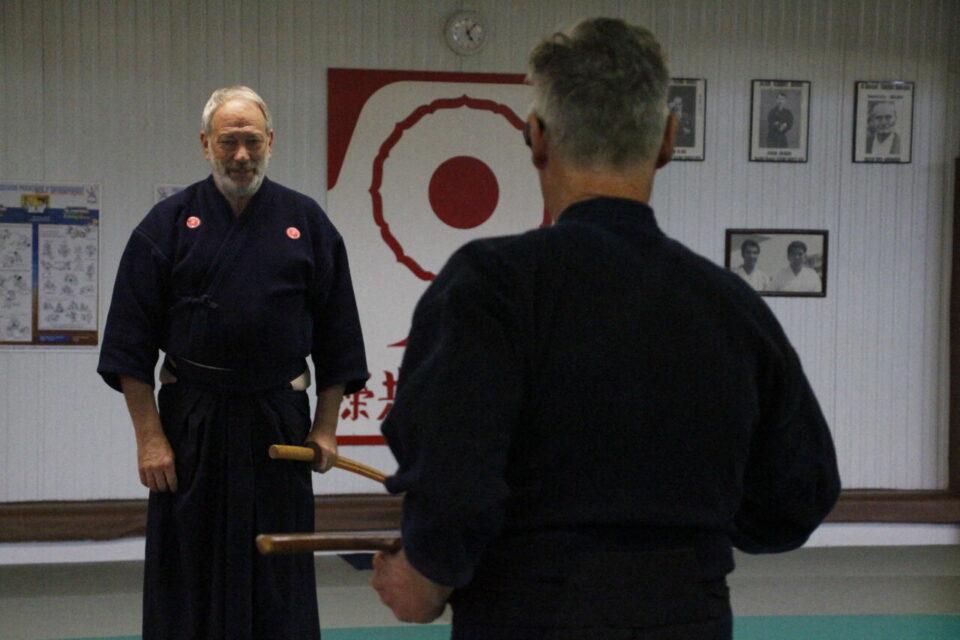By Lina Tran
Published on
Senseithis is how we call Max Lemonnier, when you enter the tatami. When the foot crosses this limit, it is no longer a specialist in budo (martial art in Japanese), but indeed “the master” who came to share his knowledge. Since the start of the school year, the resident of Goupil-Othon trained, by a Japanese grandmaster and at the head of own school for 20 yearsgiven iaido lessons at the Bernay dojo, twice a week.
Think like a samurai
iaido is simply the art of wielding and drawing the sword. It is characterized by a sequence of movement sequencescalled katawhich students learn by heart.
“It’s not just giving lessons, you also have to learn the art, culture and geography of the country, give them the love of the country. This is also the bushido (the samurai code of moral principles),” he explains. Beyond the martial art, it is a true philosophy of life followed by iaido adepts. “The samurai have an ethic like the knights of our country can have, with more respect for each other”, specifies Max Lemonnier.
Remember the samurai’s motto: Honor and dishonor are not in the sword, but in the hand that wields it.
What is a samurai, why does he have a master, why is he ready to kill himself for him (referring to the seppukuthe ritual suicide carried out by the samurai around the 12th century), Max Lemonnier literally gives a course on the history of Japan during sessions. “Students don’t just have to be there. But understand where it comes from. “. Thus, the years spent with his master allowed him to obtain a license on the history of Japan, from the 13th to the 19th century.

An expert in Japanese culture
Going through his CV, it is difficult to make more complete. Black belt in karate, practice of kung-fu, naginata (Japanese spear) and kyodo (traditional Japanese archery) and 4th dan in iaido, with the prospect of a 5th dan next year.
The love affair with the Land of the Rising Sun begins from the age of 9, in the Hauts-de-Seine where he practiced karate until he was 20, stopped by his military service. “Our teacher often took us to Japanese restaurants where he showed samurai films. At first sight, I fell in love, he says. I have become an enthusiast. I started buying books and going to conferences. My only wish on returning from the army was to find a traditional Japanese iaido school with a Japanese master. »
I rubbed off on my son. Today he lives in Japan and he is married to a Japanese woman.
Through a friend, he guides him to a Japanese master, Kenzo Fukuma, living in Paris and looking for students. “A lady in a traditional kimono, who was his wife, invited me to the private dojo. For two and a half hours I sat and listened to the lecture. At the end, I left waving to him and he caught up with me to tell me to come back the next day,” he says. follow nearly 10 years with his sensei, of which he became “the spiritual son” where he learned the art of the sword and Japanese culture. “He introduced me to theikebana (the art of folding), but also cooking and the art of clothing. »

20 years at the head of his own school
After the sudden death of Kenzo Fukuma, he sets off again in search of another master. He meets Dominique Balta, a Frenchman who has lived for more than 25 years in Japan and China. After eight years at his side, he pushed him to open his own school. “In Japan, Kenzo Fukuma’s sons were getting impatient, but I was a little reluctant after his death,” says Max Lemonnier. From the start, tacit agreement between Max Lemonnier and Kenzo Fukuma is the opening of a French branch of the Akarusa schoolhis traditional school in Japan.
In 1991, he ended up opening his own school in Fontenay-le-Fleury, under Tokushukan Association. In 2010, Max Lemonnier decided to convert to catering in Normandy, “but I continued to give lessons, because it’s right next to Île-de-France”. After going to the south of France to open another restaurant, his school closed its doors definitively after 20 years of existence. He finally returned to Normandy in 2019, to Goupil-Othon, to offer iaido lessons again.
Since September 2022, the samurai master has settled in Bernay’s dojo to train before taking his 5th dan in iado next year in Japan. At the same time, he gives lessons and introduces this discipline to Bernayens. Although he only has one student, he hopes to attract more and more, especially women to give traditional Japanese spear lessons. “In my old school, I had a few young women who I even taught iaido to. This is something that is not common in Japan,” he explains.
But this return to his native lands is also the moment to realize his ultimate dream: open his own dojo at homewhich he has already imagined, because “the private dojo is freedom of the spirit”.
The editorial staff has tested the iaido course for you. Discover the reaction of our journalist in the edition of October 12.
Was this article helpful to you? Note that you can follow L’Éveil Normand in the My News space. In one click, after registration, you will find all the news of your favorite cities and brands.

